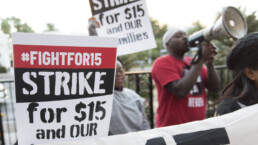Gerrymandering and the filibuster are holding back wage increases, the right to unionize and other benefits for workers.
By Paul Sonn, In These Times
New waves of workers are standing up and demanding fair treatment on the job — from the fast food workers of the Fight for $15 to the workers at companies like Starbucks, Trader Joe’s, and Volkswagen that are fighting for a union and a fair contract.
But as these workers have made significant gains, they’ve simultaneously run into huge barriers: our broken democratic systems. That’s why one of the most important priorities for advancing worker power is democracy reform.
In particular, that means reforming the anti-democratic filibuster in the U.S. Senate and ending partisan and racial gerrymandering, which have made state legislatures unresponsive to worker needs.

Take the Fight for $15. Over the last decade, the brave workers driving this inspiring campaign have won wage increases in half the states and scores of cities. As a result, about half of our workforce will soon be covered by a $15 minimum wage—one of the highest among industrialized countries. But the other half languishes with one of the lowest minimum wages in the developed world. The federal minimum wage remains frozen at a paltry $7.25.
Despite the fact that more than 80 percent of Democratic, independent, and Republican voters want to raise the minimum wage, no Republican-led legislature has passed a genuine increase in decades. Many have not only blocked state wage increases, but also passed punitive “preemption” laws to prevent cities from stepping in to ensure fair wages. Not coincidentally, many of these are among the most gerrymandered.
At the federal level, there’s a similar dynamic: Republicans in the Senate have used the anti-democratic filibuster for years to block increases in the federal minimum wage despite strong voter support.
Recent Posts
Judge Blocks Noem Effort to Bar Surprise ICE Jail Inspections as Detention Deaths Mount
February 4, 2026
Take Action Now A federal judge halted the DHS secretary’s renewed effort to block surprise inspections as deaths, overcrowding, and abuse…
Russia Ready to Respond to Any U.S. Weapons Deployment in Greenland: Ryabkov
February 3, 2026
Take Action Now With New START, the last nuclear treaty between Russia and US set to end, Moscow says it’s ready for more dangerous world.By News…
Trump’s Ultimatum to Cuba: Fuel or Surrender!
February 3, 2026
Take Action Now Trump’s latest executive order is an intensification of the six-decade US policy which seeks to suffocate and strangle Cuba’s economy…
As Trump Attacks the Republic, the Cowardly Democratic Party Still Won’t Fight to Win
February 2, 2026
Take Action Now With few exceptions, the Democratic Party apparatus is coasting, playing “it safe,” and expecting that the Trumpsters will deliver…




